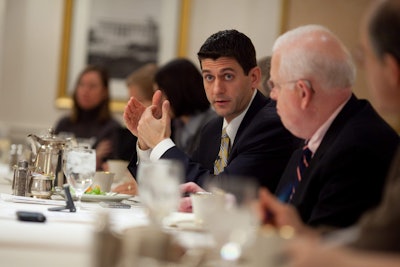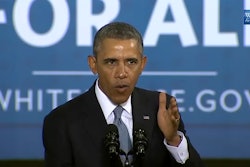
The partisan positions are simple enough (though the reality often varies): Democrats generally will spend first and find funding later, while Republicans won’t.
President Obama’s 2015 federal budget proposal is an example of the former; the House Republican version, hot off the desk of budget chairman Paul Ryan this week, represents the latter (with heavy doses of anti-Obama rhetoric).
Both are more political than practical – this is, after all, an election year – and neither are expected to get any traction in a divided Congress.
Still, the House plan does feature a transportation “function,” so let’s have a look.
The bottom line, for trucking: “Maintaining the solvency of the Highway Trust Fund and the policy of the trust fund being user-fee supported is a priority. With the Highway Trust Fund facing insolvency in late 2014 or early 2015, efforts need to be made to find a long-term solution to the trust fund’s financial challenges.”
For any editor, a passive phrase like “efforts need to be made” warrants a red pencil and note: Who, exactly, is to make these efforts? But in Washington, the passive voice is the default style – one that often obscures responsibility (“Mistakes were made.”) but more typically means, “We’ll look into it, sooner or later, maybe.”
So this says right away that the Ryan plan doesn’t offer much in the way of new revenue to pay for improving transportation infrastructure (the long-term part). However, since it’s serious about the user-pay principle, the budget-balancing is going to come from reduced spending.
First, no more covering the trust fund’s “chronic shortfalls” with general-fund transfers, unless these are offset with budget savings elsewhere. (Currently, the trust fund can be supplemented without such offsets – a budget rule “loophole” the budget plan would eliminate.)
Second, Congress should only pay for projects that are “essential” to federal interests, which is well and good except that has always been the theory. Deciding what’s important is up to the majority on the transportation committee, as always. And since the committee is led by Republicans right now, the budget proposes eliminating Amtrak subsidies, reducing TSA funding, and the like.
These non-highway spending cuts are not bad for trucking, but the savings are just one finger in the crumbling dike. Congress still has a lot of work to even get close to a new transportation authorization by the end of September. But “work is being done,” we can be sure.
Equal time: A statement from the White House press secretary calls the House budget plan “the same old top-down approach” that would “force deep cuts to investments in our roads and bridges,”etc.
The House budget blueprint can be found here; the transportation section begins on page 43.










